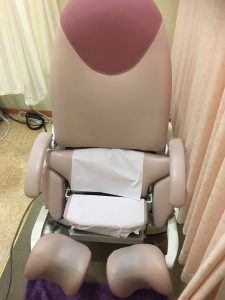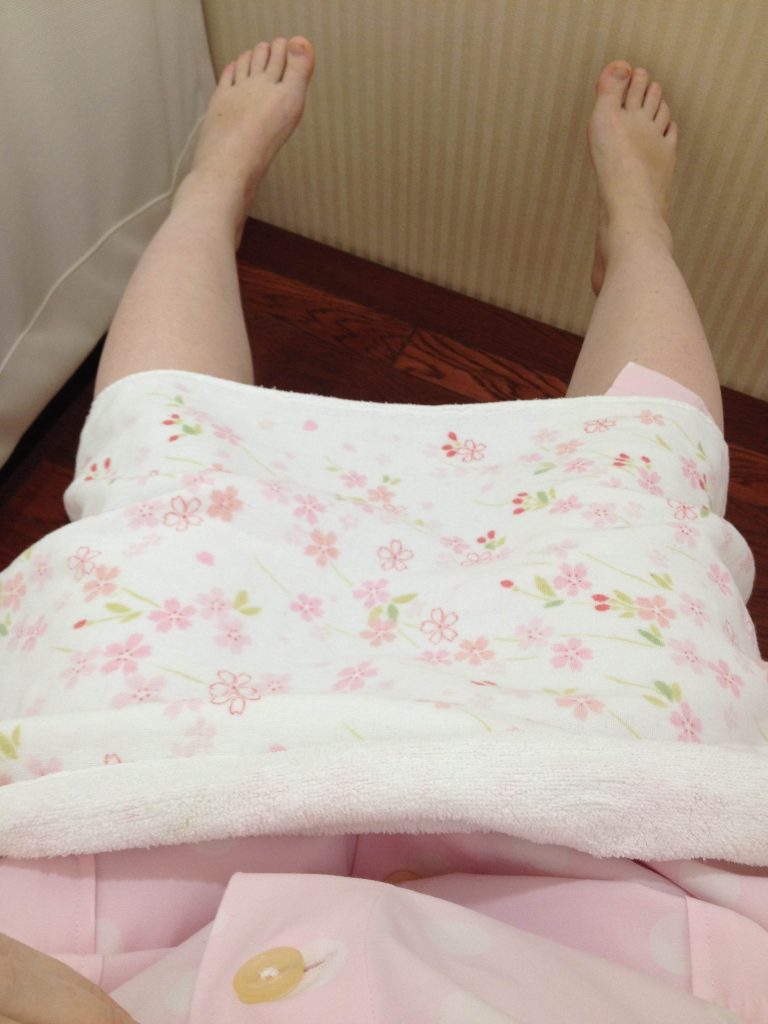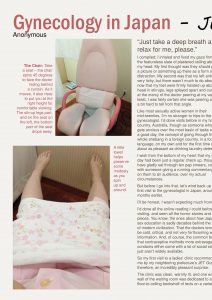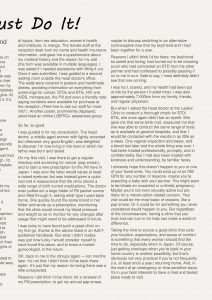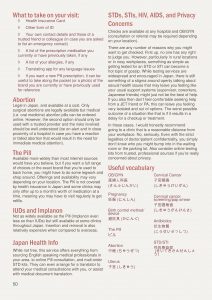Anonymous
“Just take a deep breath and relax for me, please.”
I complied; I inhaled and fixed my 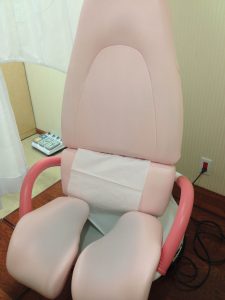 gaze firmly on the featureless slate of plastered ceiling above my head. My first thought was they should put a picture or something up there as a form of distraction. My second was that my left ankle was very itchy, but there wasn’t much to do about that now that my feet were firmly hoisted up above my head in stirrups, legs splayed apart and completely at the mercy of the doctor peering at my vagina. At least, I was fairly certain she was peering at it. It’s a bit hard to tell from that angle.
gaze firmly on the featureless slate of plastered ceiling above my head. My first thought was they should put a picture or something up there as a form of distraction. My second was that my left ankle was very itchy, but there wasn’t much to do about that now that my feet were firmly hoisted up above my head in stirrups, legs splayed apart and completely at the mercy of the doctor peering at my vagina. At least, I was fairly certain she was peering at it. It’s a bit hard to tell from that angle.
Like most sexually active women in their mid-twenties, I’m no stranger to trips to the gynecologist. I’d done visits before in my home country, Australia, though as someone who gets anxious over the most basic of tasks on a good day, the concept of going through the whole shebang in a foreign country, in a foreign language, on my own and for the first time sounds about as pleasant as drinking laundry detergent.
I wish from the bottom of my heart that my visit that day had been just a regular check up, though. I’d have gladly sat through ten pap smears, complete with someone giving a running commentary on them to an audience, over my actual circumstances.
But before I go into that, let’s wind back up to my first visit to the gynecologist in Japan, around ten months earlier.
I’ll be honest, I wasn’t expecting much from it.
I’d done all the online reading I could before visiting, and seen all the horror stories and opinion pieces. You know, the ones about how Japan’s sex education is sadly decades behind the rest of modern civilization. That the doctors tend to be cold, critical, and not very forthcoming with information. And, of course, the common belief that contraceptive methods more extravagant than condoms either come with a lot of social stigma or just aren’t widely available.
So my first visit to a ladies’ clinic recommended to me by my neighboring prefecture’s JET Guide was, therefore, an incredibly pleasant surprise.
The clinic was clean, warmly lit, and one entire wall of the waiting room was dedicated to a floor-to-ceiling bookshelf of texts on a variety of topics, from sex education, women’s health, and childcare, to manga. The female staff at the reception desk took my name and health insurance information, and gave me a questionnaire about my medical history and the reason for my visit (the form was available in multiple languages). I was asked if I needed assistance with filling it out. Once it was submitted, I was guided to a second waiting room outside the head doctor’s office. The walls were covered in posters and handmade sheets, providing information on everything from screenings for cancer, STDs and STIs, HIV and AIDS, menopause, the Pill and even a friendly note saying condoms were available for purchase at the reception (‘Feel free to ask our staff for more info!’). Another poster, prominently displayed, advertised an online LGBTIQ+ awareness group.
So far, so good.
I was guided in for my consultation. The head doctor, a middle-aged woman with lightly accented but otherwise very good English, was delighted to discover I’m now living in the town in which her father was born and raised.
On my first visit, I was there to get a regular checkup and screening for cancer (pap smear), and to start a new prescription for the Pill here in Japan. I was sure the latter would cause at least a raised eyebrow, but was instead given a quick nod and a reassurance that the clinic stocks a wide range of birth control medications. The doctor even pulled out a large folder of Pill packet covers and rifled through it, asking what type I used back home. She quickly found the same brand in her folder and wrote up a prescription, mentioning that the clinic would record my blood pressure and weight so as to monitor for any changes after usage that might need to be addressed in future.
I was lucky to have found such a great clinic on my first go, thanks to the advice listed in an AJET-published handbook. But what I didn’t realize was just how lucky I would consider myself to have found this place, and to know a trusted gynecologist, in the future.
OK, back to me in the stirrups again — ten months later. It’s not that I didn’t think I’d be back there again. It’s just that my reason for being there was a little unexpected.
Reasons I did think I’d be there: for a renewal of my Pill prescription, to get my annual pap smear, maybe to discuss switching to an alternative contraceptive now that my boyfriend and I had been together for a year.
Reasons I didn’t think I’d be there: my boyfriend, so sweet and loving, had turned out to be cheating scum who had contracted an STD from his other partner and had confessed to possibly passing it on to me in turn. Safe to say, I most definitely didn’t see that one coming.
I was hurt, scared, and my health had been put at risk by the person I trusted most. I was also approximately 7,000km from my family, friends, and regular physician.
But when I asked the head doctor at the Ladies’ Clinic to conduct a thorough check for STD/STIs, she once again didn’t bat an eyelid. She gave me that same brisk nod, reassured me that she was able to conduct the same range of tests as is available at general hospitals, and that I would be contacted with the results in as little as a week. One vaginal inspection and swipe, and a blood test later and the whole thing was over. I had been treated professionally, promptly, and in confidentiality. But I had also been treated with kindness and understanding, by familiar faces.
I sincerely hope this doesn’t happen to you or one of your loved ones. You could wind up at an OB/GYN for any number of reasons — maybe you’re expecting a baby with your partner. You might want to terminate an unwanted or untimely pregnancy. Maybe you’re not even sexually active but are there for a menstruation-related concern. Your visit could be the most basic of reasons, like a pap smear. Or it could be for something you never considered would happen to you. But regardless of the circumstances, having a clinic that you trust and can turn to for help can make a world of difference.
Taking the time to source a good clinic that suits your location, expectations, and sense of comfort is something that every woman should find the time to do, especially when in Japan. Of course, just getting checkups when you’re back in your home country is another possibility, but that’s obviously not very practical if you’re not frequently (i.e. at least once a year) returning home. And, in the event of an emergency or time-sensitive issue, it’s in your best interests to have a tried and tested place ready to visit.
What to take on your visit:
- Health insurance card
- Other form of ID
- Your own contact details and those of a trusted friend or colleague (in case you are asked to list an emergency contact)
- A list of the prescription medication you currently or have previously taken, if any
- A list of your allergies, if any
- Translating app for any language issues
- If you want a new Pill prescription, it can be useful to take along the packet (or a photo) of the brand you are currently or have previously used for reference
Abortion
Legal in Japan, and available at a cost. Only surgical abortions are legally available but medical (i.e. oral medicine) abortion pills can be ordered online. However, the second option should only be used with a trusted provider and the risks involved should be well understood (be on alert and in close proximity of a hospital in case you have a reaction or failed abortion that would result in the need for immediate medical attention).
The Pill
Available more widely than most internet sources would have you believe, but if you want a full range of choices or the exact brand that you’re used to back home, you might have to do some legwork and shop around. Offerings and availability may vary depending on your location. The Pill is not covered by health insurance in Japan and some clinics may only offer up to a month’s worth of medication at a time, meaning you may have to visit regularly to get refills.
IUDs and Implanon
Not as widely available as the Pill (Implanon even less so than IUDs) but still available at some clinics throughout Japan. Insertion and removal is also relatively expensive when compared to overseas.
Japan Health Info
While not free, this service offers everything from sourcing English speaking medical professionals in your area, to online Pill consultation, and mail-order STD kits. They can even arrange for a translator to attend your medical consultations with you, or assist with medical document translation.
STDs, STIs, HIV, AIDS, and Privacy Concerns
Checks are available at any hospital and OB/GYN (consultation or referral may be required depending on your location).
There are any number of reasons why you might want to get checked. First up, no one has any right to judge you. However, particularly in rural locations or in nosy workplaces, something as simple as getting tested for an STD or STI can become a hot topic of gossip. While testing services are widespread and encouraged in Japan, there is still something of a stigma around openly talking about sexual health issues that may leave you feeling like your usual support systems (supervisor, coworkers, Japanese friends) might just not be the best of help. If you also then don’t feel comfortable seeking help from a JET friend or PA, this can leave you feeling very isolated and out of options. The worst possible outcome of a situation like that is if it results in a delay for a checkup or treatment.
In these cases, I would honestly recommend going to a clinic that is a reasonable distance from your workplace. No, seriously. Even with the strict legalities of doctor/patient confidentiality, you simply don’t know who you might bump into in the waiting room or the parking lot. Also consider online testing kits from trusted, professional sources if you’re really concerned about privacy.
Useful vocabulary
OB/GYN 産婦人科医 (さんふじんかい)
Pregnancy 妊娠 (にんしん)
Birth control method/device 避妊具 (ひにんぐ)
The Pill ピル
Abortion 中絶 (ちゅうぜつ)
Uterus 子宮 (しきゅう)
Cervical Cancer 子宮頸癌 (しきゅうけいがん)
Cervical cancer screening/pap smear 子宮癌検査 (しきゅうがんけんさ)
Antibiotics 抗生物質 (こうせいぶっしつ)
STD/STI 性的感染症 (せいてきかんせんしょう)




